Online discussion #9 is available for comments October 31-November 6. The rubric I’ll be using to grade your participation and a description of these assignments is available here.
As with all aspects of music and music making, the economics of classical music vary from place to place and across historical periods. This discussion is an introduction to the trajectory of music history in the West (i.e., Europe and North America) for the few hundred years our course material covers. If any of this material is review for you, this in opportunity to incorporate a layer of music to your background knowledge! If you haven’t taken a history or economics course that covers these topics, use the embedded links throughout the blog post to fill in gaps in your understanding.
But, economics in a music class?
Economic factors—such as who has money, how much they have, how they spend it, and why they spend it—determine the way that music is made, what it sounds like, who listens to it, and the circumstances in which people experience music. They lurk behind all the various musical sounds we hear, and knowing a little bit of economic history can give our ears insight into the how and why behind much of the music we encounter.
There is no art without economics. Music, just as with the other arts, requires monetary support. This includes funding for obvious things like supplies (instruments and repairs, scores, paper, rehearsal space), education, and training costs. It also includes less obvious things such as some degree of financial comfort — without, for example, the stability of a warm home and food, a person is less likely to be able to devote time and energy towards making music because their attention is focused on fulfilling more basic needs. (This idea comes from Abraham Maslow’s 1943 article “A Theory of Human Motivation.”)
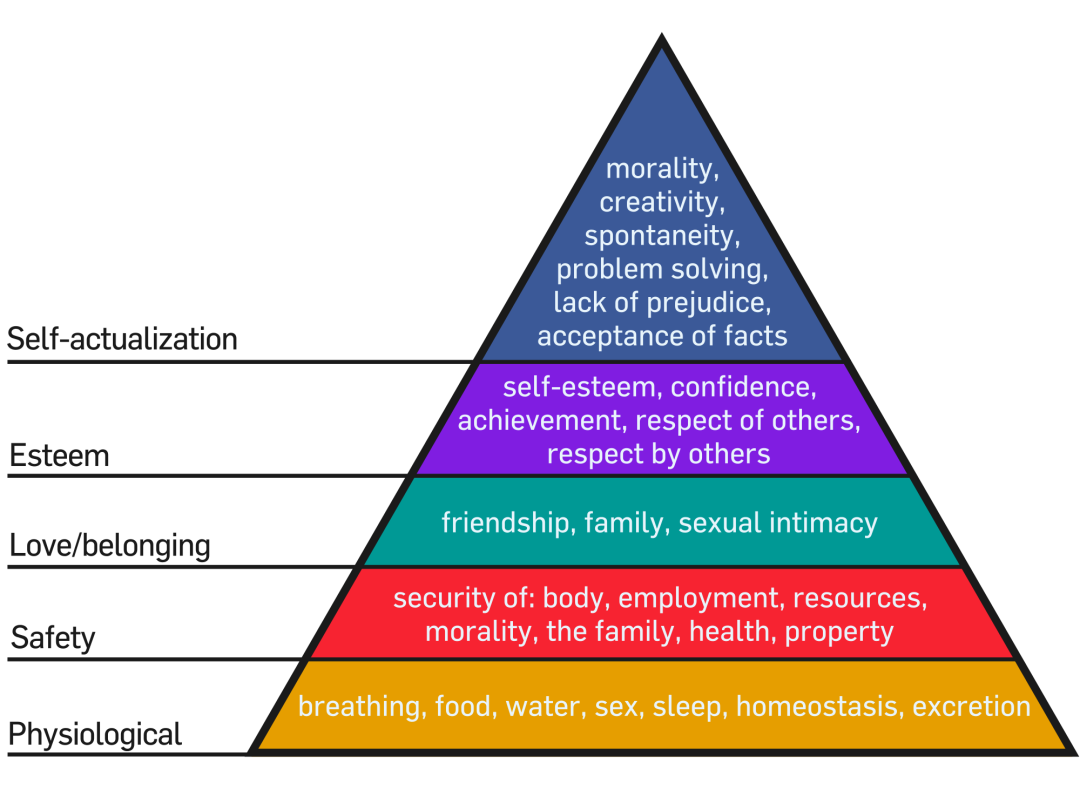
The patronage system
For most of the European continent’s history, the countries we think of as being “European” didn’t exist—e.g., France, Germany, Italy. Instead, the land was divided into multi-ethnic empires, city-states, and nomadic groups. Nations as we now know them were established in the late-18th and 19th centuries as a way to unify groups of people who shared a linguistic heritage and other common cultural features, along with geographic proximity. Kings existed, but they didn’t hold the real power (meaning wealth, military strength, or direct control of the land where food was produced); real power was wielded by aristocrats (noblemen with various titles: duke, viscount, baron, earl, lord, prince) or the Catholic Church.
And everyone else? The majority of the population consisted of peasants, and they worked in the fields generating the wealth of said aristocrats.

Part of the value of being wealthy and powerful is letting other people know that you’re wealthy and powerful. It creates a sense of respect, a healthy dose of fear, and a social class identity. One of the ways that the aristocracy and the Church were able to demonstrate their might was with the art that they commissioned, displayed, and controlled: they were the patrons of the arts, and the patronage system was the economic structure in which art was produced for these patrons. (A great background to the division of societies into people who produce food, rulers, and artisans/religious figures who consolidate those rulers’ power is the 1999 book Guns, Germs, and Steel by Jared Diamond).
Art (including music) wasn’t just a pleasant diversion or pastime under the patronage system—it was part of PR and image control for those in positions of power: a status symbol.
Architecture, for example, was used to demonstrate might and financial resources.


The visual arts captured a patron’s image for posterity. They often include not only sumptuous attire (rich fabrics, intense colors, and intricate details) but also depictions of music making, because it was believed by members of the noble classes that musical talent and musical taste proved how worthy a person was. (Remember, most noblemen and noblewomen learned to play an instrument as a hobby.)
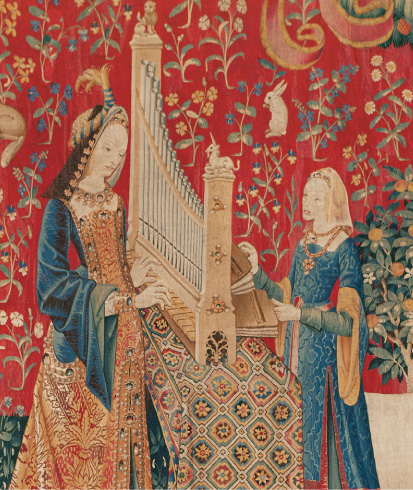
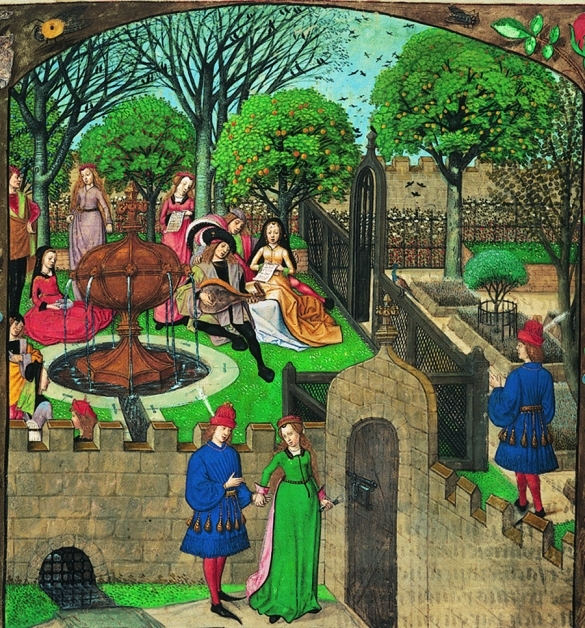
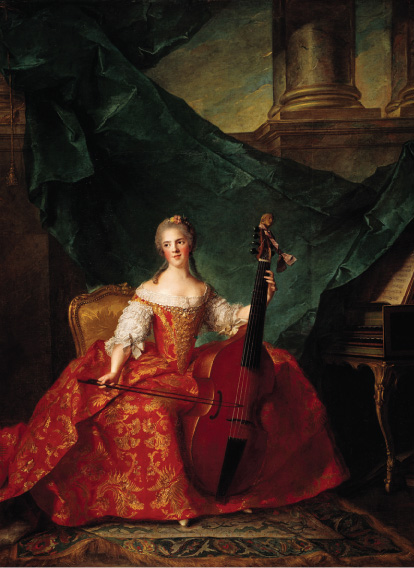
To be a musician under the patronage system meant to hold a job post at a patron’s center of power: a cathedral or an aristocratic court. This form of employment was a lifelong commitment, and a musician would earn a salary and also receive a uniform, be provided with supplies to make their art (staff paper, ink, instruments), and be housed and fed (including firewood for the winter). A musician’s duties were often extensive: a composer would also be required to teach, perform, and oversee other subordinate musicians (hiring and firing). In return, the patron had final say on everything their employee did: travelling, permission to sell sheet music, and what music was made (more on that below). It was often in a patron’s best interest to allow their musicians to travel and publish sheet music—the fame and respectability of their employee would reflect positively on the patron and add more prestige to their reputation.
Economics, taste, and self-expression

Music written for a patron was designed to suit the needs or taste of the patron. If the patron loves the baryton (as Haydn’s patron did), a composer will write a lot of music for the baryton (Haydn wrote 72 trios for the instrument, even though no one else was doing it anywhere in the world). If a patron loves dance music (like King Louis XIV of France), then their composers and musicians need to be really good at creating and playing dance music. If a composer writes music their patron doesn’t like, the patron will tell them not to write like that any more, and that will be the end of that.
Something that you may find disconcerting or uncomfortable at this point is the realization that much music that exists in the world isn’t written for personal expression—it’s a job. The contour of a melody, the emotions conveyed by the harmony, or the instruments used aren’t necessarily an expression of the composer’s desires, just what he knew would keep him employed—they express the taste preferences of whoever was footing his bills.
The rise of nation states and shift to free-market capitalism
We don’t live in strict patronage system any longer, and that makes it seem like musicians are free to create whatever they music they want—they don’t have to please a king or aristocrat who is their lifelong employer. Bring on the self-expression!
Not so fast…
The shifting political-economic landscape in late-18th and 19th centuries simply means that music is now treated in a different way. The musician’s role in society becomes one of selling goods that the public may or may not buy. Public taste is volatile (particularly when ideas are able to spread more and more quickly, as the Internet now allows), and this means that some musicians try to suit public taste (for example, commercial jingles, soundtracks, and pop music) while others simply make what they want to make, with complete disregard to whether or not consumers like it.
“The people who don’t want your music don’t change their minds. You outlive them, if you’re lucky.”
—Philip Glass, composer (b. 1937)
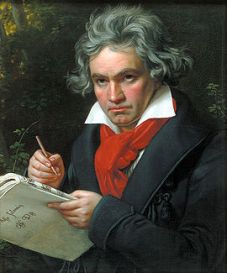
Ludwig van Beethoven (1770-1832) navigated this economic transition by using both the patronage system and the emerging capitalist markets to his advantage. He threatened three Viennese aristocrats (who loved his music and loved having him in their city) with a job offer he had received to join a court outside of Vienna. Under fear of losing him, these aristocrats caved to his threat and agreed to pay him a healthy annual subsidy to remain in the city with no other strings attached. Beethoven also shrewdly published his music simultaneously in multiple countries at once—there was no such thing as copyright law at this point, so if Beethoven had sold his work to an Austrian publisher, for example, there was nothing stopping a French publisher from copying it and selling it themselves. Beethoven’s business acumen beat them to the punch and took advantage of the fact that he was well-known across Europe, with consumers everywhere clamoring for his music.
Musicians today: the gig economy
An ideal situation for many modern musicians is holding a steady position with either an orchestra (as a performer or conductor) or a university or conservatory (teaching composition, performance, music theory, music history, or some combination of those subjects). The best jobs in these fields pay quite well, but there aren’t very many opportunities to go around. The next few paragraphs deal with orchestral performers, but the same issues are true for composers and professorships.
This 2012 article (dorris-the-audition) describes the lengthy, exhausting process of preparing for orchestral auditions: how much time it takes, what a player does to prepare, how they earn a living while trying to win a job, what happens after they win a job, how few jobs there are, and how much money orchestral musicians make. It is an easy read and features Mike Tetrault, an orchestral percussionist.
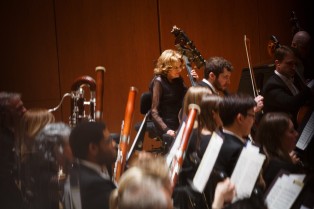
Musicians in the top US orchestras earn around $100,000 per year (depending on where the orchestra is located; players in Alabama earn less than those in Chicago, for example), and that shows how valuable and rare high quality orchestral playing skills are. There are very few top orchestras, however, and there are only 20 orchestras in the US whose average salaries are over $55,000 per year.
Demand for these jobs is high. There are 117 symphony orchestras in the US. That means there are approximately 11,700 orchestral job positions in the US, assuming each orchestra has 100 players, which is an over-estimate. But that’s not the same as saying there are 11,700 job openings there are every year, because once someone wins a good orchestral job, they hold onto it for 30-40 years. For flute players, for example, there were only 4 job openings in the US in all of 2015-16.
There are approximately 60 college-level music schools or conservatories in the US, and they typically train musicians to enter a specialized career trajectory of being an orchestral player or opera singer. Each school will graduate a class of around 150 students each year —that’s 9,000 students every year.
Add all those graduating students to the musicians who haven’t won an orchestral job yet (say, 8,975 from every previous year), plus international musicians…
Uh-oh.
The typical modern musician’s career is a prime example of the gig economy: cobbling together a living wage from several small revenue streams, none of which is sufficient on its own, none of which provides benefits like health insurance or retirement savings, and none of which is guaranteed to continue.
- Concerts— Musicians may be paid by a venue or concert series for their appearance, they may take home ticket sales, or their performance may be organized by a management company. A concert payment for a musician can range from $0 to $4,000, but most concert performances pay $100-750 per player. This also includes many orchestral jobs outside of the top orchestras, which are paid “per service” rather than a salary (around $40 per rehearsal and $150 per performance).
- Commissions— Composers charge commissioning fees when someone asks them to write a work. Rates depend on the length of the piece (longer = more expensive), the number of musicians (more musicians = more expensive), and how famous the composer is (more famous = more expensive). The commission fee may range from $2,000 to $100,000, depending on these factors. Often, groups of performers will form a consortium to commission a work and divide cost among all members, so that no single player has to bear the weight of the entire expensive commission themselves.
- Teaching private lessons— A musician recruits students to take individual lessons (in performance, conducting, or composition), finds space to teach in, prepares lessons for each student’s individual needs and desires, keeps students and parents happy, and organizes performance opportunities for their students. The cost of a one-hour lesson varies based on geography and teacher: $15 (in Texas and the Midwest), $60-75 (typical in NYC), $225 (for lessons with the most famous teachers in NYC).
- Teaching in community music schools— All the work of recruitment and infrastructure (and sometimes curriculum) is taken care of by the school rather than the teacher, but the teacher earns less per hour (in NYC students pay around $70, but much of it goes to the school itself and the teacher takes home around $25-30). There are several such schools in NYC: Brooklyn Conservatory of Music, Lucy Moses School at the Kaufman Center, Bloomingdale School of Music, Third Street Music School, and Turtle Bay Music School.
- Teaching primary education— This includes band directors, orchestra directors, and choir directors in elementary, middle, and high schools.
- Teaching secondary education— Most college and university instructors teach at more than one campus, and most positions are adjunct (hired just for that class or semester with no guarantee of being rehired).
- Grant writing — There are several foundations and government organizations that support the arts and music making, and they award money (ranging from a couple hundred dollars to millions of dollars, depending on the organization) for the creation and public sharing of artistic work via a competitive application process. Here’s a taste of what grant writing is all about.
It takes a lot of these activities to add up to a living wage, and booking one gig doesn’t guarantee that there will be more work in the future. Many musicians work “day jobs” that allow them to practice, rehearse, and gig at night: dog walker, yoga instructor, grant writer, administrative assistant, baby sitter, paralegal, plumber, or insurance salesman. Sometimes these day jobs take over, and a musician stops being a musician entirely.
Online streaming: the promised land!
You may have noticed that I left out online streaming as a source of revenue for the average classical musician working today. That’s because it typically doesn’t pay well for anyone, regardless of their musical style—the average pay is $0.0025 per play.
When musician’s recordings are played on various digital platforms, we as consumers generally pay little or nothing for the experience. YouTube, Spotify, and Pandora all include advertising on their basic levels of service (free for the consumer); it seems like artists are probably compensated for their work through ad revenue and that popular artists make significant money for their efforts because so many people are listening to their music. However, these business models pay musicians very little: Spotify pays between $0.006 to $0.0084 per play; Pandora pays either $0.0014 (non-subscribers) or $0.0025 (subscribers) per play—and depending on an artist’s contract with their record label, they’ll receive only around 40% of that money. The songwriter for “All About that Bass,” sung by Meghan Trainor, is Kevin Kadish. The song was unequivocally popular in 2014 and was played 178 million times on Pandora, but for this Kadish received a check for $5,679; another songwriter whose work was played just over one million times was paid $16.89. The less-popular but still successful band La Roux earns approximately £100 for three months of streaming. Taylor Swift doesn’t include her music in Spotify’s streaming catalogue for this very reason—it devalues the art:
“Music is art, and art is important and rare. Important, rare things are valuable. Valuable things should be paid for. It’s my opinion that music should not be free.”
It’s also worth noting that Swift is in a position of considerable privilege–she can reject the means by which less-established or less well-known artists connect with new listeners because she is already successful and also because she makes money via other avenues, such as ticket sales for her live shows.
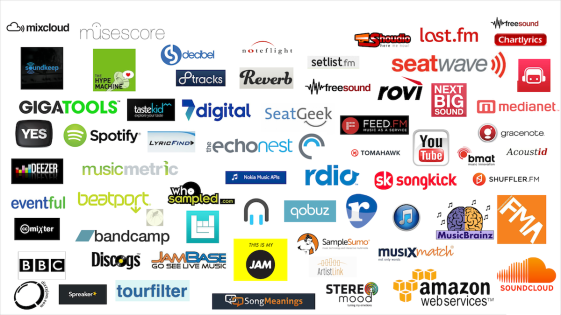
The irony of recorded music being ubiquitous in our lives (meaning that we can’t imagine our daily activities without it and that we prize its perfection) is that it seems we value it less than ever.
Final thoughts
Making music is more complicated than just being inspired and sharing sounds with the world. Oftentimes the most financially successful musicians aren’t necessarily the most talented, the most interesting, or the most artistic—they’re the ones whose skills (musical and business skills) aligned with the economic demands of the time and place in which they live. The music we’re left with over time is the music that was created in courts and churches that had the means to fund and preserve copies of sheet music over several centuries (not necessarily the best music), and the music we come across on the radio or digital media is often also the result of a musician being aligned with record companies, management, or promoters who have the economic clout to ensure that their music is heard (again, not necessarily the best musicians).
-Dr. J.
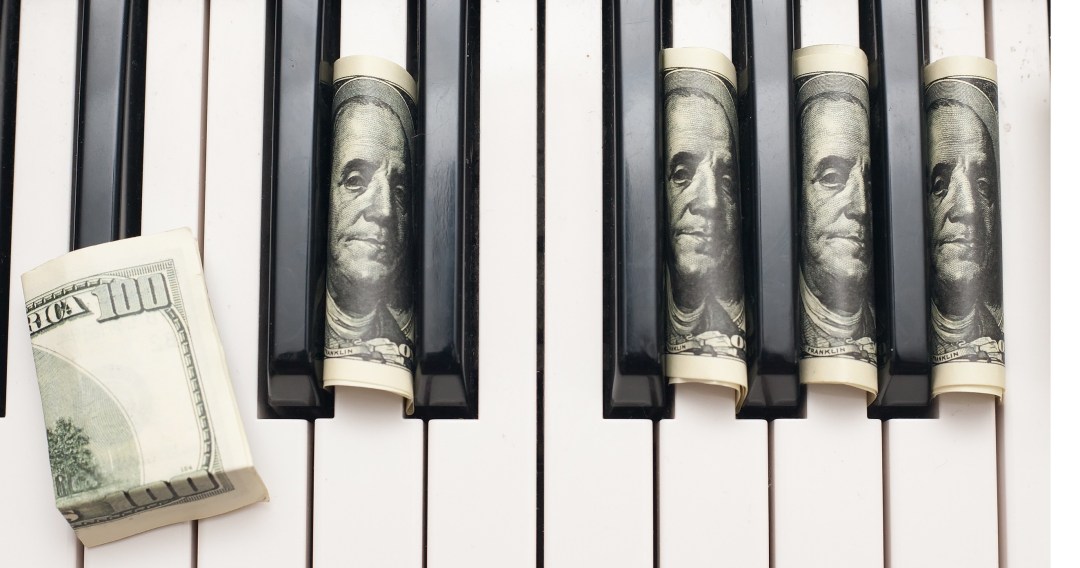
This passage was very interesting to read because many people tend to overlook the fact that making good music take alot of money. The saying “ You get what you pay for” is very true in the music world. Most of the music we hear may not always come from the most talented musicians, but those who have the means and supplies to pay for production, mixing, mastering, promotion, and copies of sheet music to pass their music on to other musicians for years to come. Life can also be tough for full time musicians because they must do everything out of pocket. They have no health benefits, dental, sick time or paid vacations , & there’s no 401K .. so its up to you to take of yourself & your future on your own. I also like the fact that a gig economy is broken down & explained so people can have an idea of the payscale musicians go by.
LikeLiked by 2 people
What do you think you took from all of this? I see that there’s not much profit in music but where do you think that leaves someone who decides to be a musician for a living?
LikeLike
I think it is not always true that there is not much profit in making music. If a musician works hard and put lots of effort, money can be INSANELY good sometimes.That is how the famous musicians of today got famous. For those who decides to be a musician for living I think they have to be ready to work twice as hard as the competition and manage their money and save it for when times are slow.
LikeLiked by 1 person
Do you think a musician gets more money then some artists based on who sponsors them or who their connections are?
LikeLiked by 1 person
Well some of them do get more money because they might have connections with other rich musicians who can help them prepare big concerts or they might have strong publishing royalties.
LikeLike
I never thought about how making music is capital intensive and some aspirin artists are literally homeless and live from hand to mouth because they don’t have much money and they invest their money into their dreams of becoming big artists. I agree with you, that most musicians are on their own, they have no benefits from their employer because they are their own employer and I think it takes so much courage to be a musician in the face of so many adversities and economic hardships.
LikeLike
What do you think the motivation is to keep musicians going?
LikeLiked by 1 person
I’d say it’s just the love of making music. I’m sure they’re perfectly happy getting paid any amount to do what they enjoy.
LikeLike
If you were a artist, would you be perfectly happy getting paid any amount?
LikeLike
I believe that many musicians or musical artists these days aren’t driven by anything but the money. But there are still some artists that actually enjoy the creation of music and the fans that enjoy it. For those people i think the end result of it all is the motivation.
LikeLike
Money is what keeps them motivated.
LikeLike
First and foremost, Being a musician isn’t all about making top dollar, but many people use it as an outlet to share their feelings, inner thought, beliefs and understanding to the world and that I believe is pertinent when making music, be it for pleasure or as a profession; people need to be able to relate to music in order to enjoy it.I think it would become some sort of commodity in a way, like playing non-competitive sports or any other kind of hobbies. For instance in terms of the upper socio-economical classes like in the past (no working family would think of buying instruments or getting musical education just for the hell of it, but rather because of the potential and growth in which an individual contains or has a compassion for substantially.
LikeLiked by 1 person
The motivation to keep musicians going will be asking themselves the most important question which is, Why he/she got into the music industry? This is something they have to remind themselves many times, especially during financially tough periods. They have to always remember the passion that got them started as a a musician. They have to continue evolving.
LikeLike
What do you think elements and condition to be good musician?
LikeLike
Never knew that high class people had such control over musicians in that matter. I think a lot of the downfall in profit in music is due to downloading/illegal downloading of music it takes away the experience of going out of your way and buying album/vinyl and the artist make little to no compensation for their art which is extremely unfair. I can recall when Napster was the big site to go when you wanted free music. A war against Napster and musicians. Streaming takes away a lot like going to a concert of buying music because you can just go online for those things. It’s like going to the internet to look at a piece of art instead of going to a museum. I think modern society has a huge impact on careers like being a musician and it leaves us struggling. Does anyone know of a way an artist could really make it? Because I sure don’t.
LikeLiked by 1 person
I never really thought about the economics of making music. It was really heartbreaking to know that average musicians struggle to make money from the music industry. The fact that they work tirelessly hard to master their craft and do not get paid enough is really sad. Today’s technology made it very easy to get music for free. However, In my opinion, music should not be free. Although it would be nice to have music for free it is not fair for the artists who are putting all their time and effort into creating it for us to not get compensated for their work. I mean if music were free then how will the musicians put food on their table? Why should one profession be fairly compensated and another not?
LikeLiked by 2 people
Let me know about your opinions guys! Should music be free? What do you guys think?
LikeLiked by 1 person
I think music should be free for specific group of people. As we said, the economics will affect the need of music. So for some place, people don’t have enough for music but if music is free, they will still have the chance to listen to it. That’s what music made for.
LikeLiked by 1 person
*enough money
LikeLike
I respect your opinion, I think the whole point of music is to have people listen to it.
LikeLike
I think you made a good argument as to why music shouldn’t be free, i agree that we should pay for music because its the right thing to do.
LikeLike
I think it should be free, that way everyone and anyone has the access and the ability to listen to music.
LikeLike
I don’t think it should be free all the time. The artists put a lot of work into making it and they should have some sort of compensation for their hard work. It all depends on the person making the music. If they feel like their work should be free then they should make it free but if they want people to pay for it then they have every right to do so.
LikeLike
I think music will never be free, it is hard to balance between money and music but if the music is free, the composer will lose their interest to make music, no one will do a thing that doesn’t have payback. However, if the music is too expensive, most people can’t afford it, just like music in the past that’s only for upper class. I think the music right now is in good balance between money and music.
LikeLike
I absolutely agree with you. Music being free takes away the motivation from a musician who is struggling financially. There should be a balance between these two factors.
LikeLike
I believe that music in recorded form should definitely be paid for. If all types of music were free, people who are musicians as a living would have no source of income; while it is a nice idea to make music accessible for everyone at no cost, it is simply unrealistic as with almost everything in life.
LikeLike
I agree with that economics making music. I mean in the old day, people were care food more than care about soul food because it’s their first needs. People didn’t have enough money to buy food, clothing and live in a well benefited house, so, their physical needs were more important. But after we have enough money, we were started to pay attention on our spiritual enjoyment. Therefore, the economic level of a country will directly showing on their need of music which means they have money to pay for the spiritual enjoyment. That’s my understanding about the economics making music. As for the question should music be free, I think it should be free sometimes to inspire the people who doesn’t have money can also be a great musician.
LikeLike
The music industry in general is complex but not hard to understand since it’s part business. The thing to take account of is that not all musicians and artists will charge money for their songs. They may just self publish on youtube or something and could even monetize which is cool. But some people may just release free music to download. In terms of performing artists being a job like for say being signed to a record label that owns majority of your content, the money is really depending on your level of popularity for the most part. Now a days it’s the connections and shares that raise awareness and bring new people out of the shadow. It’s a broad topic but the economics in music I believe are determined by your personal dedication and persistence. Do you guys think an artist may gain fans by releasing free music or lose fans?
LikeLiked by 1 person
From this discussion “economics” is unfortunately a huge part when trying to make it big in the music industry. Its sad but true, we see people in the subways all the time playing their music, some might be poor and some might just wanna be noticed for their talents. I agree that just because someone has money and is a good musician doesn’t make them the best. The best musician might be that person playing their instrument in the subways just trying to be recognized.
LikeLike
What is your definition of the”best” musician?
LikeLiked by 1 person
For me, definition of a best musician will be, a person who makes good music, satisfied his/her fans with the music, makes good amount of money and never lost passion about music.
LikeLike
If you were a musician how would you try to make it big in the industry, without economics playing a role?
LikeLike
I completely understand the economics behind making music. Just like making movies, or making television shows it can’t be put together for free. Most of these famous pop stars did not start out with the millions of dollars they have now. If you work hard enough and have the passion for what you love doing you will ride up the latter toward success. That way once you get to a mature age you’ll be able to keep your life together and know what to do with all that money. However I think who you are related to, or who sponsors you, or what kind of connections you have play a big part on how famous or how much notice you get which leads to more money. For example I think Usher sponsoring and discovering Justin Bieber had a lot to do with his now success and all the money he makes at such a young age. I also think looks and gender possibly have an influence on the economics behind music. I believe that if your a hot young male singer you’ll be making a lot more money and getting more concerts due to all the ladies looking at you. Where as average looking musicians might not get the same recognition and money as much as them.
LikeLiked by 1 person
Does anyone think gender and appearance such as being labeled hot or not has a lot to do with the money you make and the gigs you get?
LikeLiked by 1 person
Is it really worth it to risk all in order to become a musician? Is it worth the homelessness that others face, the poverty or the poor quality of life in pursuit of dreams?
LikeLike
This discussion board is closely related to the article we read in class last week “Bach’s Duties and Obligations at Leipzig”. To me, the ridiculous amount or rules, restrictions and responsibilities these composers had wasn’t worth any amount of money. They obviously felt different about it, but I’m sure it’s because they actually enjoyed writing and composing music and it didn’t actually feel like work.
LikeLiked by 1 person
Would anyone take a lifelong job with the same rules as these composers? Not just for music but for something that you love and you’re good at?
LikeLike
Most likely not. Unless I’m really broke and have no other job options
LikeLike
I wouldn’t. I think some of the rules of this job are completely harsh and cruel. No matter I much I love music, this rules can affect me negatively and can even make me hate music.
LikeLike
It is extremely important to think about music from this stand point. People tend to think that the artists of today, made it big just because of their love for music. But no. They make their money through many means like sponsorships as well. Some artists write music for other people, like Bruno Mars or Neyo. Music artists also make money from featuring in another persons song and concerts. Seeing the actual amount of money getting paid out to the artist from the amount of plays they get online is crazy because that isn’t even a proportion of their wealth.
LikeLike
I agree with your opinion about “sponsorship” and “online”. However, as positive aspect, I think that if some singers who were not famous, they can get a chance spreading their existence through online like Youtube. From that if they get approval their talents or compel from watchers, It can make connecting to financial solution as well.
LikeLike
With this discussion of making a living out of music, is there anyone here that is a music major here? It would be interesting to hear the perspective of someone who is about to be in this competitive world.
LikeLike
The comparison that is evident within this discussion intrigued me , based on how music was made in the Patronage system vs. modern day . Throughout the Patronage system music seem more like an occupation. They made music to please a figure of authority. That’s says to me , without that superiors acknowledgement or the fact that if they valued your piece, would alter your self-esteem or self–worth Today we are under the impression that an artist makes music that is personal or has a motive and is made in hopes people like their particular style, which to an extent is true but every musical artist wants exposure. They start with a growing fan base, and eventually becomes “mainstream” and land a huge record deal and have sponsorships. At that point it’s becomes less of making music that the artist originally wanted to make, hoping people like it, and it becomes more of making music that responds well in exchange for more money and more popularity. They become “sell outs” they are no longer making the music they made because they now have to adhere to a record company. However, on the contrary, it can argue that they still make music for the fans or new type of audience that is targeted. Making music for a superior can be quite similar to CEO, or the managers that capture you. An example of this can be seen by one of my favorite groups known as “NWA”. the main goal is to gain economic stability. I believe that our responsibility, and compassion as musicians is not only to perform or to compose, it is also to keep alive our cultural heritages as we enrich the music world with our new innovations. We must stay true, and honest too ourselves, and emphasize our originality.
LikeLiked by 1 person
Some questions that come to mind, after reading this passage are; How do you define your creative style, and how do you creatively innovate and take risks without losing that? or How is making music for a King compared to the CEO?
LikeLiked by 1 person
For me its in a way sad to see that those with high class had such a tight grip on musicians back in the day on what they had to do so they can continue to compose. I could see it as a way of gaining a sort of income but to be limited on creative freedom doesn’t seem right to me. By having the freedom to create whatever you want then you’re able to explore out into different styles and maybe even create new types of sounds. You can even see these types of things happen in current time, those that are rich that have enough money to take musicians under their companies name control what they release. Those lucky enough to have the wealth already though can be seen to try new sounds and genres in making music. Freedom creates the ability to explore. If you cant explore then you’ll always be stuck doing the same thing over and over again.
LikeLike
I’ve always said the meaning of life is having a job you enjoy. Sometimes it doesn’t make the most money and can be stressful, but if it’s what we’re passionate about it’s always worth it!
LikeLike
How would things change if instead the musicians had the final say in things if they higher class wanted the music so badly.
LikeLike
I never knew how much a musician can truly struggle to make money through their music. I used to think they made a lot of money just by producing many pieces but after reading this article, i see the true meanings behind a musician’s life. I understand why they say music shouldn’t be free, but i don’t entirely agree because not everybody would be able to afford it. And in other cases, some people are cheap and don’t want to spend money on every song they like (me).
LikeLiked by 1 person
I do agree not everyone can afford to go to a concert or buy the albums, but that is how the musicians make money and because we do not really buy albums we just listen to them on youtube (me) they don’t get as much money as we think, still, in my opinion, they make more money I will ever do.
LikeLike
So if Kanye dropped an album tomorrow, you would wait a month or two(under the contracts of tidal) for it to be available for the public(YouTube)? You would not download Tidal?
LikeLiked by 1 person
Do you think decades from now all music will no longer be free?
LikeLike
Maybe not decades from now or maybe sooner, but I believe that music will no longer be free. We’re already overwhelmed with all these streaming sites and artist releasing their music. Social media has also played a huge role in what is trending as far as music goes. There’s also so many music subscriptions available now as well. For example, we all know Pandora as a free online radio station, but now they offer monthly music subscriptions for revenue.
LikeLike
why wait for decades? Music should never be free. It is unfair for the musicians to create good music for us and not get anything in return.
LikeLike
Music should be for people and their enjoyment not just revenue.
LikeLike
This passage was very intriguing and eye opening. Its amazing how being in a position of financial power can propel a career. It is also sad that a song played for more than a million times generates a revenge that can easily be spent on lunch a QCC and a bus ride to and from home and school.
LikeLiked by 1 person
We all know music is universal for all of us, and we can just so easily get involved with music: play, sing and listen etc. In the past, music not like today is the entertainment for all the upper class, and they have the ability to control the style of music, the taste of music so that the idea of good music in past may be hard to determine. Even though today we still consider the good music of some classical music in the past, there is the chance that in the past there is much more good music hasn’t been handed down, but the people don’t accept that in the past. I think don’t different in right now, the most of the music we are listening is the music that published, widespread and popular for most of the people. Those music use tons of money to publish, to promotion, to design. Those music don’t for free, they made it for money, that means more commercially valued music are easier to distribute. So right now those “best” music is not equal to the best music, I think it just most popular or most “best sell” music.
LikeLiked by 1 person
Some question I really want to ask: When we determine a good music, we mostly looking at numbers of sales, it really a good thing or bad thing? and why?
LikeLike
because nothing can actually live without money. I can’t say it’s good or bad thing to determine music through the number of sale but it’s the easiest and efficient way to measure if this piece of music is valuable. the producers put money let musician make music, they need reward.
LikeLiked by 1 person
If you like it, then its good to you. Numbers don’t mean nothing because it depends on if you like the artists and their music.
LikeLike
It was interesting to see Abraham Maslow’s hierarchy of needs come up in this discussion. I’ve spoke of Maslow’s hierarchy of needs in my sociology class and my speech class. I love how important this pyramid is and how it can tie in and be used as a perspective from music as well.
LikeLike
I didn’t like that making music was just a job, that it wasn’t for any leisure time or personal expression like it should be. Composers just did what they thought would bring in money.
LikeLike
Never acknowledged how much work and time is put into making music. I thought it should be easy to just express your feelings and thought and turn it into music for others. Especially, how money plays a big role is music being made.
LikeLike
If patronage system for musicians was by aristocracies in an old time, now, I think it is converted to contracting between musicians and agency, and manager for musician as well. Talent for musicians is the most factor, however, they need to find good agency which support for well-placed connections, because it can get a band in front of the right audience and increase their profile. Also, it becomes cause for financial solution for musicians. In addition, although online did not make enough money, i think that it can bring chance for spreading musicians’ level of awareness. For example, Korean pop singer, Psy’s Gangnam style is a good example. Psy is popular singer in Korea, but he was not a world singer. His agency used online Youtube instead of commerce. The agency put his music video on Youtube, and he became world famous singer. So, I think agency is powerful with musicians’ talent.
LikeLiked by 1 person
In my opinion, music can come from anyone, money is not what makes the music put the person who wrote it or play it. Although money does not make the music, they can help you get better equipment or it can help you get famous by getting people to listen to you. Money can help a musician in a lot of ways, yet not everyone has the money to do so, but still, it is not impossible to get your music to be heard nowadays, there is always a way as long as you try.
LikeLiked by 1 person
Music is a job like everything else out there. It is not an easy one and it takes a lot of work, and like dancing it has a lot of ricks. If someone listens to a singer music video and then live they can see the difference in the voice, that where the money comes from, I am not saying everyone does this but in my opinion, there are better voices out there we never get to hear.
Something else important to remember is that we may not like the way they make music so long ago but that is because of all the freedom that we have. At the same time, in my opinion, those people could have made more money than the people we listen to today because to be able to listen to them you will have to go to their concerts but now we just go to youtube and listen to them 24/7.
LikeLike
Money is such an intricate part of society. If musician and artists makes their work for free, how can they support themselves. Money doesnt determine the success of an artists, it just opens more doors for them. If you have the passion for making music, money is just another hurdle to overcome.
LikeLiked by 2 people
Do you think it could have been better if we couldn’t listen to music but only if we had bought it?(No Youtube or free download)
LikeLike
like the saying “Music is art, and art is important and rare. Important, rare things are valuable. Valuable things should be paid for. It’s my opinion that music should not be free.” Because I know there are still lots of people not respect it, they never learn it, they don’t know how hard it is, and even some of them just feel it’s a way to make fun.
I taught children play the piano at summer, so I know is you are a professional pianist (not very famous yet), it is really hard to make a lot money, and some music school owner will take the most (about 70%) of it.
it’s true that arts always related to economics, because money is the essential and basic requirement for everything, including arts.
LikeLiked by 1 person
should music instructors tell those students whose major is music which are not very talented but really love it to give up?
LikeLiked by 2 people
Why would someone do that? It’s never okay to tell someone to give up in their dreams but suggest and give them critical feedback to better themselves.
LikeLike
Some professional instructors in any field actually do tell students in anything to give up that dream because they weren’t’t meant for it which really sucks and thats sad but, some students succeed in the future
LikeLike
What I’m surprised about when reading this article is how the money is broken down. When I see music videos of money flashing of hundreds and how these rappers are getting money, but after reading the numbers of how they make their money is astonishing. I always wondered about YouTube especially, because once an album is dropped from an artist with a high status, literally their whole album will be available for free on YouTube. And after reading this article that question was finally answered. However, artists make more money on appearances at clubs or any type of event. I believe social media as well, but I can be wrong. But this should motivate artists to become better, and get their names known by all, and not a particular groups.
LikeLiked by 1 person
It’s so difficult now a days to be a musician, especially being able to support yourself. Back then musicians were given shelter and all the necessity to survive. They also make so little, but what will happen if musicians were given more like healthcare, pension, or retirement plans to financial support themselves? Will there be more musicians in the field?
LikeLiked by 1 person
What I loved the most about this post is that it truly made me realized how fundamental art is to our society and makes me realized how far we’ve gotten as a race. Without the comfort of finance and shelter music wouldn’t really be at the level it’s at now . We don’t realize how much of a luxury music and art is .this reading honestly added to my appreciation on music and art as a whole.
LikeLike
while growing up my mother always told me money isnt everything. After reading this i can tell her shes wrong. not just with music but with anything once you have the money you wouldnt settle for less. not saying that a persons work is worth less just that its hard to get recognized without money. people are always just waiting for the outcome and never want to know the journey and struggle you took to get there
LikeLike
What was most interesting to me was the section about gig economy. As a musician under 21 I play a lot of unpaid gigs, so do many of my friends. I’m fortunate enough to have a father who plays music, so I can rehearse in my own house. Many musicians in NYC live in apartments, therefore they have to rent a studio to rehearse in, with money they definitely aren’t making from playing music. Being a working musician can be a daunting and stressful job, but the people who are successful don’t regret the hard work they put in to deserve success. What other aspects of being a working musician do you think make the job harder?
LikeLiked by 1 person
In my opinion, economics in music is an unfortunate necessity. Music in its pure form should be accessible to everyone, nobody should be deprived of such an art form. However, in realistic terms, it is impossible to have a constant source of good quality music being produced without paying for such services. Individuals, however, certainly have the right to put out their music for free or for a price.
LikeLike
For those who believe music should be free, how could the system be changed so that music can be completely free?
LikeLike
Years ago (a century ago) or even more it was rare to find someone with a singing or playing instrument talent. Now a days you have literally the whole world (population) everyone is into the Music industry so its hard to find someone that tops millions of people because everyone is doing music. Money is a way to get yourself known in the music industry you either have the money to make ur way to the top of the food chain or you got a giving talent by God to do music and be that one in a billion of human being in the world to make music. In my opinion you either know someone in the music industry to make yourself known or you have money does anyone agree?
LikeLike